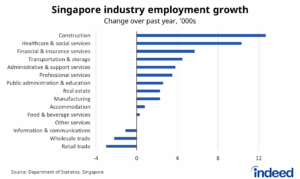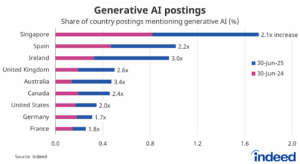In an economy that seems to reinvent itself every quarter, where AI tools roll out faster than app updates, industries pivot overnight, and skills that were premium yesterday become baseline tomorrow, one truth remains constant. A business’s resilience is only as strong as the skills it cultivates.
That’s the central message that emerged from Future-ready Skills: Insights from Singapore’s Job Market, a recent session presented by Indeed’s Senior APAC Economist, Callam Pickering, at Indeed Talent Trends.
Growth, Gaps, and a Need for Agility in the Labour Market
According to Indeed’s Hiring Lab, Singapore’s labour market looks healthy at first glance. Employment is 1.5% higher than a year ago, which means 59,000 more people have jobs than this time last year. However, this growth is not evenly distributed. Construction and healthcare accounted for 54% of all new employment in the past year, underlining how certain sectors are driving the recovery.
Unemployment remains impressively low at 2%, but the hiring story has more layers. Job postings, while down from last year’s peaks, are still 42% above pre-pandemic levels. In fact, 98% of sectors are hiring at rates higher than 2019, and 16% of sectors have postings that are double their pre-pandemic volumes. The vacancy rate, sitting at 3.2%, remains above the historical average, which is a signal that demand for talent has not cooled.
It seems to be here that the challenge is not a lack of jobs, but instead it is finding the right skills to fill job vacancies.
Expanding Your Talent Pool is Profitable More Than it is Progressive
When competition for talent is fierce, many companies instinctively double down on the tried-and-tested: targeting the same candidate profiles, backgrounds, and favouring familiar career paths. But in a market this tight, that is like fishing in a pond where every competitor is also casting their line.
Expanding your talent pool means intentionally opening the gates to candidates you might have overlooked before:
- Career-switchers bringing transferable skills from other industries
- Mid-career professionals re-entering the workforce
- Candidates from underrepresented communities
- Workers with non-linear or unconventional career paths
From a purely economic standpoint, this approach increases your access to skills, lowers the cost per hire (because you are competing in less saturated talent pools), and boosts long-term retention, since non-traditional hires often value the opportunity more and stay longer.
The Numbers Present Their Case
One of the more striking points from Indeed’s Hiring Lab data was the shift in early-career hiring. Job postings for graduates in 2025 are down 19% compared to last year, and apprenticeships have seen a 20% decline. Yet, both categories remain well above 2019 levels, where graduates are 60% higher, and apprenticeships 22% higher.
This means two things:
- There is still a strong market for entry-level talent, but employers may be slowing hiring in response to economic caution or adjusting their intake to prioritise skill alignment.
- If you are willing to create on-the-job learning pathways, you can capture capable talent before your competitors restart their hiring surge.
Put simply, there is a window right now to recruit and develop skills before the demand curve spikes again.
AI as an Accelerator
Singapore’s position as a global leader in Generative AI adoption is undeniable. As of June 2025, 14.8% of job postings mention AI, and 1.7% explicitly reference GenAI. Almost half of all GenAI-related postings come from the top 1% of employers, with nearly three-quarters from the top 5%.
AI is transforming not just how businesses operate but also who they need. It is not replacing human talent; it is reshaping the talent equation. The future-ready workforce must combine technical fluency with capabilities that AI cannot easily replicate, such as, strategic thinking, creative problem-solving, emotional intelligence, and adaptability.
Organisations that expand their talent pool to source candidates with diverse skill backgrounds and invest in their targeted upskilling, will be better positioned to harness AI’s potential rather than be disrupted by it.
To learn more about how AI is reshaping the workplace in Singapore, download the latest study from Indeed and The Straits Times, titled the “Work Ahead” report.





